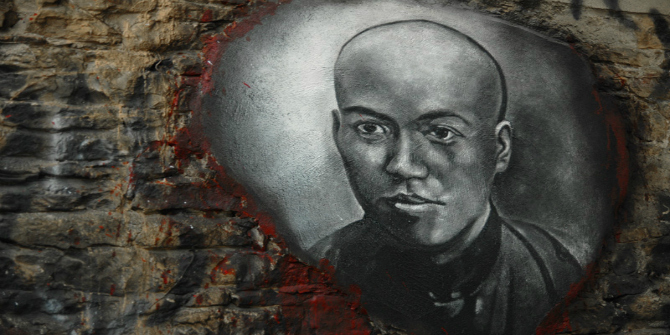 Sean Gaston sets out to provide an account of the concept of world from the mid-eighteenth century to the end of the twentieth century, exploring its possibilities and limitations and engaging with current issues in politics and ecology. He focuses on the work of five principal thinkers: Kant, Hegel, Husserl, Heidegger and Derrida, all of whom attempt to establish new grounds for seeing the world as a whole. The reader does not need to be a Kantian or Derridean scholar to enjoy the publication – though it would help and certainly enrich one’s reading – however, the title does demand a strong philosophical background in order to appreciate the intricacies of perspectives at work, writes James B. Cuffe.
Sean Gaston sets out to provide an account of the concept of world from the mid-eighteenth century to the end of the twentieth century, exploring its possibilities and limitations and engaging with current issues in politics and ecology. He focuses on the work of five principal thinkers: Kant, Hegel, Husserl, Heidegger and Derrida, all of whom attempt to establish new grounds for seeing the world as a whole. The reader does not need to be a Kantian or Derridean scholar to enjoy the publication – though it would help and certainly enrich one’s reading – however, the title does demand a strong philosophical background in order to appreciate the intricacies of perspectives at work, writes James B. Cuffe.
 The Concept of World from Kant to Derrida. Sean Gaston. Rowman & Littlefield. September 2013.
The Concept of World from Kant to Derrida. Sean Gaston. Rowman & Littlefield. September 2013.
There is a plausible need to discuss what we mean by the world, for in any discourse from ecology to politics the intonations of a concept of the world can have important yet subtle ramifications. Derridean scholar and Reader in English at Brunel University Sean Gaston proposes that while the world is discussed in various forms in different traditions, the world as concept has not received adequate attention and deserves a closer look. This title does not engage with contemporary polemics; it instead seeks to uncover the historical trajectory of the concept of the world. While such an exegeses may not be commonly available it does appear that concerns of a world is a central task of philosophy since Kant. Foucault sums it up well:
‘…the task of philosophy as a critical analysis of our world is something which is more and more important. Maybe the most certain of all philosophical problems is the problem of the present time and of what we are in this very moment’
If this is our central task then it is equally important to understand the discursive unfolding of the concept of the world. The main figures in Gaston’s excavation are well known to us – Kant, Hegel, Husserl, Heidegger and Derrida. Gaston lays out the foundation for his discussion by referring to the logic of containment in the ancient Greek philosophies. The world, in its metaphysical sense, is that which contains but itself is not contained. The world is holistic rather than partial and with this there is a certain value judgement at work considering the metaphysical world in its wholeness or completeness as being above or beyond the material empirical world and our subjective relations with it. The concept of the world is not as straightforward as our everyday usage of it might suggest.
The opening of the first chapter offers an enjoyable recollection of the first time humanity could see the planet we inhabit from the moon. The images of the Apollo 11 mission in 1969 provided some of the first captured images of the planet external to the planet. It leads us to question from what position or vantage point do we stand when we talk about a world. Does the sun rotate around the Earth? Do we exist in the end of days? Are we on the cusp of some brave new world? From our vantage point are we talking about the planet, the world, some cosmological whole or foundational grounding? A consequence of the subject-matter is its immediate relevance to everyday contemporary life: for example, Gaston quotes Hume in 1779: ‘Whatever cavils may be urged, an orderly world, as well as a coherent, articulate speech, will still be received as an incontestable proof of design and intention’ (p.4). There is clearly relevance to the contemporary here.

Initially the world for Kant is an idea, not a concept, as we cannot have direct experience (in Kant’s time) of the wholeness of the world. This starting point weaves forward as Gaston masterfully provides insight into (and a fluid reading experience of) Kant’s dense writing style relaying Kant’s regulative and categorical uses of the world as idea. These are then linked in full attainment of a concept of the world grounded in a reactive experience. Returning to the world as a blue dot in space, if we act in the understanding of the planet we inhabit as circumscribable it may give greater capacity to understanding the world holistically as an entity suffering consequences from our actions. Global warming is global in the sense that we consider the problem to globally affect the world as a whole. How humanity acts upon or in the world can vary greatly in relation to how we understand the very thing to which we are acting; a world that contains us or one that we can contain. Gaston writes:
“The Kantian regulative idea of the world which suspends any claim to the world itself as a given or self-evident concept, is still the most radical concept of world in the history of philosophy. Insisting that one must act as if there is a given world, it invites the possibility of a philosophy without world” (p.28).
Hegel’s treatment of the world only arises in the third and final stage of consciousness to facilitate the arrival of self-consciousness. The movement of consciousness to self-consciousness in the Phenomenology when the consciousness moves from defining itself through external objects to taking itself as its own object brings the world into focus. The referent for representations appears to involve some interplay between ones’ own consciousness and the contextualisation of one’s own consciousness: my here-and-now, whether fictional or not. The proposal of a philosophy without a world is a theme that concerns Gaston throughout the book. Derrida’s concern of acting as if there is some totalizing world in the Kantian tradition reminds us of the normative implications of an ‘overriding and centralizing logos of analogy and proportion’ (p.115). Any particular problem of global concern configures a global world to a localised yet universalising concern, a world for particular types of global citizens rather than a world shared by heterogenic peoples, reasons, cosmologies etc.
The ideas contained within this book generate a desire and a demand to return to first material. There is a wealth of exploration to do and with Gaston hitting his stride in relation to Derrida and synthesising the thinkers around the concept of the world there develops a shared enthusiasm to trace the concept elsewhere. I must admit discontent that Gaston does not elaborate on his own concept of the world in the last section, which appears to be a metaxological framework. No sooner does he introduce it then he dismisses it as a ‘grand metaphysical gesture against metaphysics’ (p.162) but greater discussion would itself have been enjoyable.
It is no easy task for an author to decide who to include in such an exercise and it is too easy for a reviewer to comment on authors they feel should have been included. Of course, I am going to do it anyway and express my disappointment that Mikhail Bakhtin did not get a mention anywhere. Bakhtin’s espousal of the co-being of existence would have proved an interesting marker in comparison to Kant and Derrida. Gaston does include reference to other thinkers as they relate to his main five, notably Kojève, Hyppolite, and Gaston justifies his selection of the main thinkers from the outset. The reader does not need to be a Kantian or Derridean scholar to enjoy the publication – though it would help and certainly enrich one’s reading – however the title does demand a strong philosophical background in order to appreciate the intricacies of perspectives at work. If the reader has a decent familiarity with the thinkers or topic than I can whole-heartedly recommend this book as a thoroughly enjoyable read.
James Cuffe is an anthropologist working at the Department of Criminology at University College Cork. He is General Editor of the Irish Journal of Anthropology. Read more reviews by James.







1 Comments